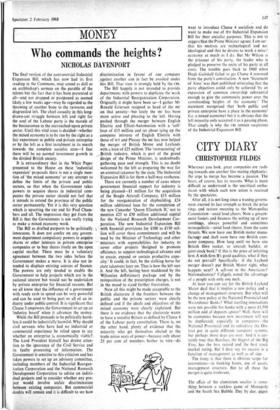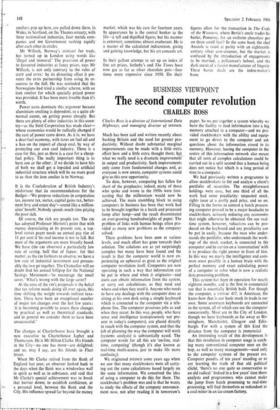CITY DIARY
CHRISTOPHER FILDES
Wherever you look, great companies are rush- ing towards one another like mating elephants: the urge to merge has become a passion. The heart, of course, has its reasons. What is more difficult tp understand is the uncritical enthu- siasm with which each new union is received by the spectators.
After all, it is not long since a waning govern- ment exerted its last strength to break the price rings and restore meaning to the Monopolies Commission—amid loud cheers. Now a govern- ment fosters and finances the setting up of new ‘combirats. always powerful and sometimes • monopolistic—amid loud cheers, from the same throats. We now have one British motor menu- factwitr and shall soon have one British com- puter company. How long until we have one British fibre maker, or aircraft builder, or joint-stock bank? If this is the price of infecting firm A with firm B's good qualities, what if they do not prevail? Specifically: if the Leyland merger doesn't put British Motor right, what happens next? A sell-out to the Americans? Nationalisation? Caligula noted the advantage of a people with only one neck.
At least you can say for the British Leyland Motor deal that it implies a new policy and a change of management structure. But what will be the new policy at the National Provincial and Westminster Banks? What startling innovations were not possible for banks with a mere £1,500 million odd of deposits apiece? Well, there will be economies because new investment will not be duplicated, especially in computers—the National Provincial and its subsidiary the Dis- trict put in quite different computer systems, but perhaps those days are over. And it is cer- tainly true that Barclays, the biggest of the Big Five, has the best record and the best stock market rating. But I dare say its success is a function of management as well as of size.
The irony is that there is obvious scope for innovations—in banking hours, use of assets, management structure. But to all these the merger is quite irrelevant.
The affair of the aluminium smelter is some- thing between a reckless game of Monopoly and the South Sea Bubble. Day by day, paper smelters pop up here, are pulled down there, in Wales, in Scotland, on the Thames estuary, with three nationalised industries, four metals com- panies and HM Government rushing rapidly after each other in circles.
Mr Willoch, Norway's minister for trade, has turned up in London using words like 'illegal and immoral' The provision of power to favoured industries at fancy prices, says Mr Willoch, is not only contrary to the rules of OAT r and EFTA: by its distorting effect it pre- vents the EFTA partnership from using its re- sources to the full. He was reminded that the Norwegians had tried a similar scheme, with an iron smelter for which specially priced power was provided. It has been more trouble than it's worth.
Power costs dominate this argument because aluminium smelting is dependent, to a quite ab- normal extent, on getting power cheaply. But there are plenty of other industries in this coun- try—as the Steel Corporation has made clear— whose economics would be radically changed if the cost of power came down. As it is, we have a dear-fuel economy, with taxes on fuel oil and a ban on the import of cheap coal, by way of protecting our own coal industry. There is a case for this, just as there is a case for a cheap- fuel policy. The really important thing is to have one or the other: if we decide to have bits of both we shall get a lopsided and artificial industrial structure which will be no more good to us than the iron smelter is to Norway.
It is the Confederation of British Industry's misfortune that its recommendations for the Budget—'We propose reductions in corporation tax, income tax, surtax, capital gains tax, better- ment levy and estate duy'—sound like a million- aires' benefit. Nobody spends much time pitying the poor rich.
Of course, the rich are people too. The an has adopted Professor Merrett's point that with money depreciating at its present rate, a top- level surtax payer needs an annual pay rise of 11 per cent if his real income is not to fall. But most of the arguments are more broadly based. We have (the au observes) a particularly low rate of saving, half that of Japan : for that matter, as the an forbears to observe, we have a low rate of industrial investment and presum- ably the two go together. The Chancellor will no doubt find his annual lollipop for the National Savings Movement—go encourage the small saver.' What's wrong with the large saver?
At the core of the an's proposals is the belief that tax reform needs doing all over again,.this time shifting the weight towards indirect taxa- tion. There have been an exceptional number of major tax changes over the last few years: it is becoming possible to assess these changes by practical as well as theoretical standards, and in general we consider them to have been unsuccessful.'
The changes at Charterhouse have brought a new executive to Charterhouse Japhet and Thomasson. He is Mr Hilton Clarke. His friends in the City—no one has more—are delighted; and so, may I say, are his friends in Fleet Street.
When Mr Clarke retired from r the Bank of England last year, an observer looked back to the days when the Bank was a windowless wall in spirit as well as in substance, and said that Mr Clarke's special achievement was to break that barrier down; to establish confidence, at a personal level, between the Bank and the City. His influence spread far beyond the money market, which was his care for fourteen years. In appearance he is the central banker to the life—a tall and dignified figure; but his manner is extrovert, sometimes almost exuberant. He is a master of the calculated indiscretion, giving and gaining knowledge, but his art conceals art.
In their gallant attempt to set up an index it)f fine art prices, Sotheby's and The Times have now got as far as silver chocolate pots—four times more expensive since 1950. Do their figures allow. for the transaction in The Code of the Woosters, where Bertie's uncle trades his butler, Pomeroy, for an oviform chocolate pot on three scroll feet? In the same book the chef Anatole is rated at parity with an eighteenth- century silver cow-creamer, but the market is confused by the introduction of engagements to be married, a policeman's helmet, and the dark secret of a fascist manufacturer of lingerie. These barter deals are the index-maker's bane.



































 Previous page
Previous page